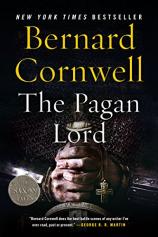The Pagan Lord
Review
The Pagan Lord
For some time, Bernard Cornwell’s Saxon Tales has been building up to one climactic moment, what the people at the TV Tropes website call a “Crowning Moment of Awesome.” Early on in the series, the hero, Uhtred, is robbed of his birthright, which in his case is a large, isolated castle in the Northeast of England called Bebbanburg. Much is made during the series of two key points: Uhtred is determined to get his castle back, and the castle itself is well-nigh impregnable. In order to capture the castle, Uhtred has to raise --- and lead and feed and pay --- a very large, well-equipped army, most of whom will die in the attempt. Throughout the books, Uhtred has never been able to accomplish it, despite his great prowess as a warrior and his many victories. Thus far, it has not been his destiny to do so.
Uhtred’s fate changes significantly in THE PAGAN LORD, the latest in the Saxon Tales series. This time, his fate does lead him to Bebbanburg, but not at the head of an unstoppable army. What happens in that assault I will not reveal, except to say that some things, even Crowning Moments of Awesome, never turn out the way you think they will.
"Cornwell does a masterful job of showing not only how Uhtred fights, but also in how he uses his wits to backstab, threaten, bluff, and maneuver his way into a position where he’s able to fight with the best possible odds."
Each of the Saxon Tales ends with a battle and is followed by a historical note about the real battle that took place, who fought it, and what it meant for the future of England. In the battle that concludes THE PAGAN LORD, Cornwell informs us that this is one of those battles about which very little is known, other than a brief note in the Anglo-Saxon Chronicles. This leaves Cornwell with some room for invention, and he comes up with a classic battle scene, in which Uhtred must maneuver and scheme to hold off an invading Viking army until reinforcements arrive to aid his smaller force. Uhtred again is fated to be at the center of the shield wall, and the weltering gore he finds there should be enough to satisfy the most bloodthirsty of readers.
What separates THE PAGAN LORD from the rest of the series, in my mind, is the focus on identity. Many of the classic themes in the Saxon Tales are explored here --- religion, revenge, and the relationship between Danes and Saxons --- but Cornwell seems primarily interested here in just who Uhtred is. Early in the novel, Uhtred’s son becomes a Christian priest, and Uhtred not only disowns him but takes his name away, labeling him “Father Judas” and bestowing the Uhtred name on his next oldest son. Shortly after that, Uhtred himself symbolically loses his own name after being forced to go into hiding following a spasm of rage. Cornwell makes clear that, in Uhtred’s attempt to take Bebbanburg, Uhtred is at least as angered by the fact that his usurping uncle’s descendants had adopted the name of Uhtred for their own. The fight to retake the castle is essentially a fight over who is truly entitled to the name of Uhtred of Bebbanburg.
THE PAGAN LORD doesn’t resolve the issue of Uhtred’s identity or provide him with a Crowning Moment of Awesome. What it provides the reader is the image of Uhtred carrying Serpent-Breath and Wasp-Sting once again into battle, against hopeless odds, with the only options available being victory or death. It certainly could be that Uhtred doesn’t have an identity any longer, that he is doomed by fate to be a warlord, to have to step into the shield wall once again to protect the people of the land that will be called England from the foreign invaders.
But in the end, the things you do and the way you do them are often more important than who you are. Cornwell does a masterful job of showing not only how Uhtred fights, but also in how he uses his wits to backstab, threaten, bluff, and maneuver his way into a position where he’s able to fight with the best possible odds. Which is always a good idea, of course, because battles, novels, and everything else we do never turn out like you think they will.
Reviewed by Curtis Edmonds on January 17, 2014
The Pagan Lord
- Publication Date: January 6, 2015
- Genres: Adventure, Fiction, Historical Fiction
- Paperback: 320 pages
- Publisher: Harper Paperbacks
- ISBN-10: 0061969729
- ISBN-13: 9780061969720





